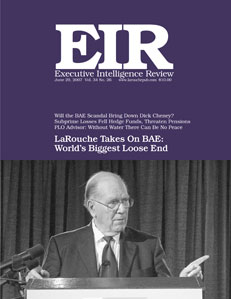BAE: The World’s Biggest Loose End
by Lyndon H. LaRouche, Jr.
Lyndon LaRouche, addressing a Washington webcast, laid out the strategic significance of the scandal surrounding British defense giant BAE Systems, its bribery of Saudi Prince Bandar, and the role of Dick Cheney and others in creating a $80-100 billion slush fund for use in covert operations, over two decades. This scandal occurs at a time of global financial collapse, “the end of a period of history,” LaRouche said. The BAE affair provides us with the opportunity to act—starting with the impeachment of Cheney.
But in addition to this strategic briefing, LaRouche did something “rather different” this time, as he explained. He delved into the core scientific/epistemological issues—from Nicholas of Cusa to Einstein—ignorance of which has prevented citizens and leaders from acting effectively to save their nations. “I’ve not said this in this form, in this kind of audience, because it would not have been appropriate earlier,” he said. “Why? Because the public was not scared enough, and not shocked enough, to realize that changes had to be made.” But now, the time is here
Investigation
Will BAE Scandal of Century Bring Down Dick Cheney?
by Jeffrey Steinberg
This is a London scandal, not a Saudi scandal, since it reveals the way the inner system of Anglo- Dutch power operates. Cheney is in deep trouble with his London friends, because he was supposed to prevent the real story of the BAE scandal, the existence of a $80-100 billion secret fund, from ever ever seeing the light of day.
Is the Sun Setting on Bandar’s Covert Career?
by Michele Steinberg
Prince Bandar and 9/11
by Jeffrey Steinberg
Chilean Fascist Pinochet Was Also BAE’s Man
by Cynthia R. Rush
Will BAE Scandal Sink U.K. End Run on U.S. Arms Law?
World News
Missile Defense: Cheney’s Nuclear War Doctrine
by Carl Osgood
Vice President Cheney is implementing a new, offensive nuclear warfare doctrine designed to promote an Anglo-American military empire. And Russian President Putin knows exactly what he is up to, and has outflanked him—at least for the moment.
India-U.S. Military Alliance Threatens Trilateral Cooperation
by Ramtanu Maitra
Behind the GOP/FBI Vendetta vs. Murtha
by Anita Gallagher and Jeffrey Steinberg
The White House got caught with its pants down when it tried to close down the National Drug Intelligence Center, solely because it is in the district of Iraq War opponent Rep. John Murtha (D-Pa.). Just last year, the White House had praised the work of the NDIC.
75th Anniversary of FDR’s Nomination: At the 1932 Democratic Party Convention, Roosevelt Calls for a ’New Deal’
by Nancy Spannaus
After winning the Presidential nomination in 1932, Roosevelt addressed the convention—the first time a nominee had done so—because he believed that the American people had lost faith in their government, in their leaders, and in themselves, and needed to see decisive leadership so that control of the party could be wrested from the bankers who ran it.
FDR: ‘Restore America to Its Own People’
by Franklin Delano Roosevelt
The full text of Roosevelt’s speech to the Convention.
Economics
Subprime Losses Fell Hedge Funds, Threaten Pensions
by Paul Gallagher
Some big hedge funds have started to fall apart because of the U.S. subprime mortgage meltdown, leading to warnings of a systemic financial blowout.
PLO Policy Advisor: Without Water, There Is No Viable State, No Peace
An interview with Dr. Shaddad Attili.
Danish Maglev Plan a Challenge to Germany
by Michelle Rasmussen
Book Reviews
Is the Sun Setting on Bandar’s Covert Career?
by Michele Steinberg
The Prince: The Secret Story of the World’s Most Intriguing Royal, by William Simpson.
Interviews
Dr. Shaddad Attili
Dr. Shaddad Attili is a Policy Advisor on Water and Environment, for the Negotiations Support Unit of the Palestine Liberation Organization, Negotiations Affairs Department. Trained as a geologist, he was recently appointed as the head of the Palestinian delegation on the Steering Committee of the Red- Dead Canal Feasibility Study.
Departments
Banking
by John Hoefle
Wall Street’s Toxic Waste.
Editorial
Cheney on the Ropes



